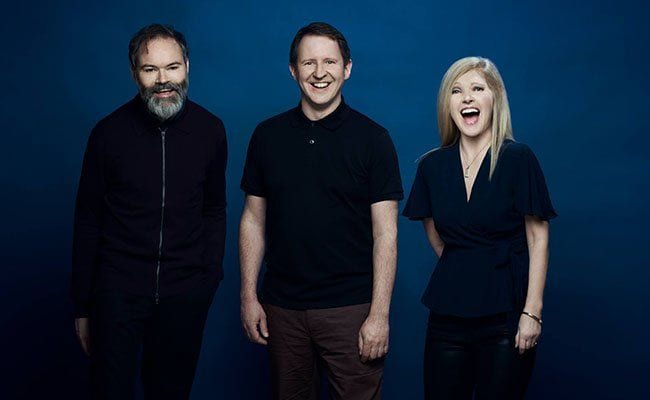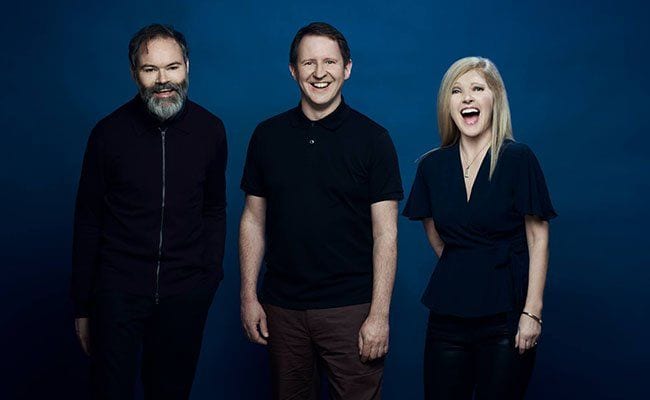
Artifice versus authenticity. One of the great conflict points of pop music since something like the Tornados’ Telstar in the early ’60s showed that great music could be about more than the sweat on Elvis’s brow or the impassioned scream on Little Richard’s lips. No one would normally associate Kraftwerk’s music with the words “heart”, “fire” and fervor”; but, as the German electro-masters’ three-night stint at London’s Royal Albert Hall has just demonstrated, they remain pop masters, pioneers without equal in their field. The ’80s were littered with artifice, which was part of its attraction.
Too much artifice is a criticism that could be justifiably thrown at the near-three-decade career of Saint Etienne. Driven by the old-school leanings of Pete Wicks and Bob Stanley (who started out as music journalists and, in the latter, harbor someone whose writings combine academia and sharp insight in equal measure), and the voice of Sarah Cracknell, simply gorgeous in its smoothness, the omens were auspicious. Saint Etienne’s drawings from the dance house culture of Acid House and Stanley and Wicks’ ’60s scholarly knowledge and feel chimed well with the ’90s and marked them out from the more orthodox sounds of Britpop. But the air of distance and an impression that the band didn’t care that much about what they were singing, proved to be a handicap. And so they remained more cult than mainstream: one for the insider cognoscenti rather than the hordes that chose to follow Oasis, Blur et al.
And so it has stayed over the nine albums of Saint Etienne’s odyssey. Which brings us to the just-released number nine, in the shape of Home Counties, trailed as a concept album about the collection of counties that circle London in the southeast of England. It’s a quirky concept, given the slightly dull monotone — in contrast to London’s vibrant primary and diverse colors — of this quite conservative part of England; and one wonders if the band, surely no little-Englanders, were prompted to adopt it as a response to the UK’s Brexit vote in 2016.
You would have to search hard for Brexit-related undercurrents; more to the point, the concept doesn’t come off. The record may be littered with song titles (“Whyteleaf”, “Angel of Woodhatch”) that reference obscure Home Counties suburbs. The lyrics display an almost unhealthy infatuation with railway stations and, if nothing else, Home Counties does to some extent manage to convey the contrast between banal commuterland and pastoral countryside in southeast England.
But the whole fails to add to the sum of the parts. Of course, it wouldn’t be a Saint Etienne album without some glorious pop moments; the chorused vocals on “Magpie Eyes”; the sub-Motown stomp, complete with Spectorish echo, of “Underneath the Apple Tree” (the epitome of a chaste lyric); the moments on “After Hebden” (which, incidentally, is a, er, village in Yorkshire in northern England) when Cracknell, in flawless voice throughout, lifts the chorus an octave and injects some authentic passion into what she is singing.
Unfortunately, there are just as many leaden interludes: “Heather”, a club song, which seems unsure of its direction (even if it possesses the priceless Delphic lyric: “she comes and goes like the warmth in the daylight”); “Out of My Mind”, where the ubiquitous synthpop backing starts to pall; mundane instrumentals like “Church Pew Furniture Restorer”. “Sweet Arcadia” was probably meant to be the signature track, but it doodles and eventually vanishes into nothingness alongside its train journey.
In conclusion, Home Counties is not without its high points, and Cracknell’s vocals deliver a sugar rush like few others. But the artifice — the sensation that the band is telling you an in-joke that is simply too knowing and clever-by-half — remains present and correct. Saint Etienne will always be interesting, and may still have a classic album in them, but maybe they need to drop the intellectual tendencies and simply embrace the music of the idols whom they so clearly adore.

